牛津译林版英语七上:Unit2课堂笔记
- 格式:docx
- 大小:27.74 KB
- 文档页数:4
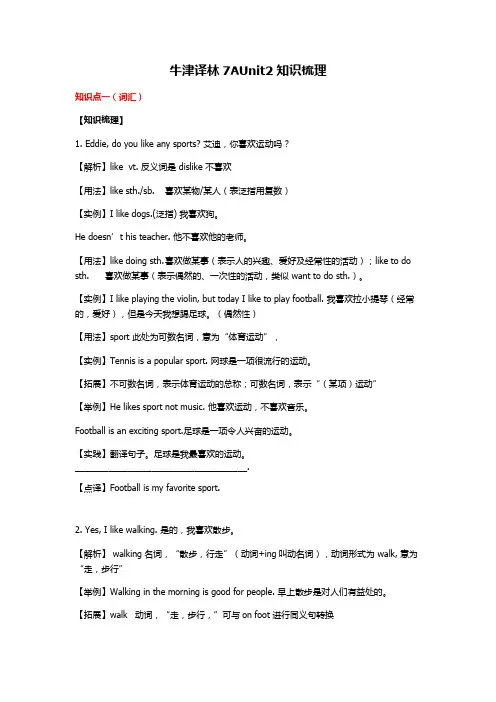
牛津译林7AUnit2知识梳理知识点一(词汇)【知识梳理】1. Eddie, do you like any sports? 艾迪,你喜欢运动吗?【解析】like vt. 反义词是 dislike 不喜欢【用法】like sth./sb. 喜欢某物/某人(表泛指用复数)【实例】I like dogs.(泛指) 我喜欢狗。
He doesn’t his teacher. 他不喜欢他的老师。
【用法】like doing sth. 喜欢做某事(表示人的兴趣、爱好及经常性的活动);like to do sth. 喜欢做某事(表示偶然的、一次性的活动,类似 want to do sth.)。
【实例】I like playing the violin, but today I like to play football. 我喜欢拉小提琴(经常的,爱好),但是今天我想踢足球。
(偶然性)【用法】sport 此处为可数名词,意为“体育运动”,【实例】Tennis is a popular sport. 网球是一项很流行的运动。
【拓展】不可数名词,表示体育运动的总称;可数名词,表示“(某项)运动”【举例】He likes sport not music. 他喜欢运动,不喜欢音乐。
Football is an exciting sport.足球是一项令人兴奋的运动。
【实践】翻译句子。
足球是我最喜欢的运动。
____________________________________.【点译】Football is my favorite sport.2. Yes, I like walking. 是的,我喜欢散步。
【解析】 walking 名词,“散步,行走”(动词+ing叫动名词),动词形式为 walk, 意为“走,步行”【举例】Walking in the morning is good for people. 早上散步是对人们有益处的。
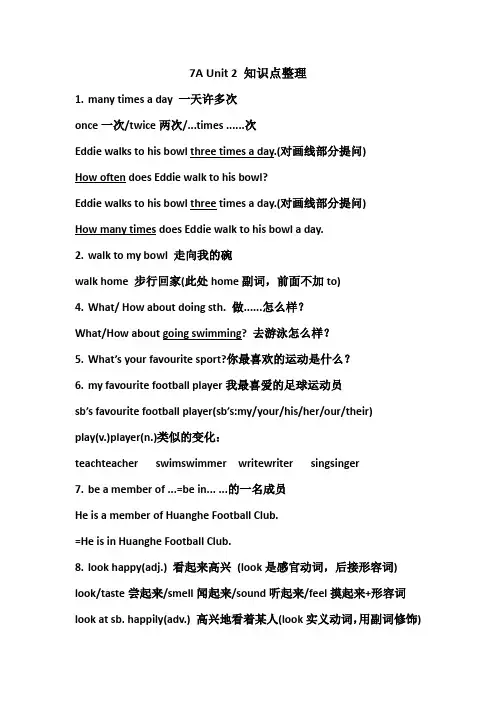
7A Unit 2 知识点整理1.many times a day 一天许多次once一次/twice两次/...times ......次Eddie walks to his bowl three times a day.(对画线部分提问)How often does Eddie walk to his bowl?Eddie walks to his bowl three times a day.(对画线部分提问)How many times does Eddie walk to his bowl a day.2.walk to my bowl 走向我的碗walk home 步行回家(此处home副词,前面不加to)4.What/ How about doing sth. 做......怎么样?What/How about going swimming? 去游泳怎么样?5.What’s your favourite sport?你最喜欢的运动是什么?6.my favourite football player我最喜爱的足球运动员sb’s favourite football player(sb’s:my/your/his/her/our/their)play(v.)player(n.)类似的变化:teachteacher swimswimmer writewriter singsinger7.be a member of ...=be in... ...的一名成员He is a member of Huanghe Football Club.=He is in Huanghe Football Club.8.look happy(adj.) 看起来高兴(look是感官动词,后接形容词) look/taste尝起来/smell闻起来/sound听起来/feel摸起来+形容词look at sb. happily(adv.) 高兴地看着某人(look实义动词,用副词修饰)My parents look happy and they look at me happily.9.play football very well足球踢得非常好(very well副词修饰动词play)10.What does he look like?=How does he look?He looks slim.他看起来怎么样?(提问外貌)他看起来苗条。
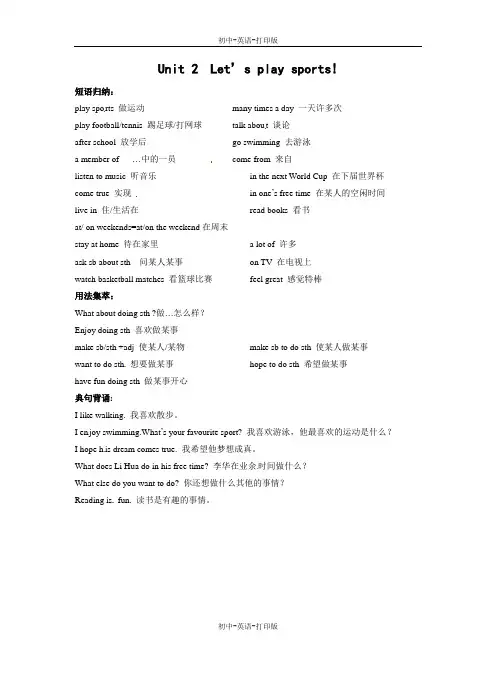
Unit 2 Let’s play sports!短语归纳:play sports 做运动m any times a day 一天许多次play football/tennis 踢足球/打网球talk about 谈论after school 放学后 go swimming 去游泳a member of …中的一员 come from 来自listen to music 听音乐in the next World Cup 在下届世界杯come true 实现in one’s free time 在某人的空闲时间live in 住/生活在read books 看书at/ on weekends=at/on the weekend在周末stay at home 待在家里 a lot of 许多ask sb about sth 问某人某事on TV 在电视上watch basketball matches 看篮球比赛feel great 感觉特棒用法集萃:What about doing sth ?做…怎么样?Enjoy doing sth 喜欢做某事make sb/sth +adj 使某人/某物make sb to do sth 使某人做某事want to do sth想要做某事hope to do sth 希望做某事have fun doing sth 做某事开心典句背诵:I like walking. 我喜欢散步。
I en joy swimming.What’s your favourite sport? 我喜欢游泳,他最喜欢的运动是什么?I hope h is dream comes true. 我希望他梦想成真。
What does Li Hua do in his free time? 李华在业余时间做什么?What else do you want to do? 你还想做什么其他的事情?Reading is fun. 读书是有趣的事情。
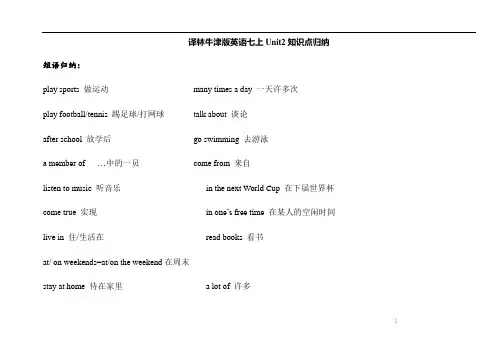
译林牛津版英语七上Unit2知识点归纳短语归纳:play sports 做运动many times a day 一天许多次play football/tennis 踢足球/打网球talk about 谈论after school 放学后 go swimming 去游泳a member of …中的一员come from 来自listen to music 听音乐in the next World Cup 在下届世界杯come true 实现in one’s free time 在某人的空闲时间live in 住/生活在read books 看书at/ on weekends=at/on the weekend在周末stay at home 待在家里 a lot of 许多1ask sb about sth 问某人某事on TV 在电视上watch basketball matches 看篮球比赛feel great 感觉特棒用法集萃:What about doing sth ?做…怎么样?Enjoy doing sth 喜欢做某事make sb/sth +adj 使某人/某物make sb to do sth 使某人做某事want to do sth 想要做某事hope to do sth 希望做某事have fun doing sth 做某事开心典句背诵:I like walking. 我喜欢散步。
I enjoy swimming.What’s your favourite sport? 我喜欢游泳,他最喜欢的运动是什么?2I hope his dream comes true. 我希望他梦想成真。
What does Li Hua do in his free time? 李华在业余时间做什么?What else do you want to do? 你还想做什么其他的事情?Reading is fun. 读书是有趣的事情。
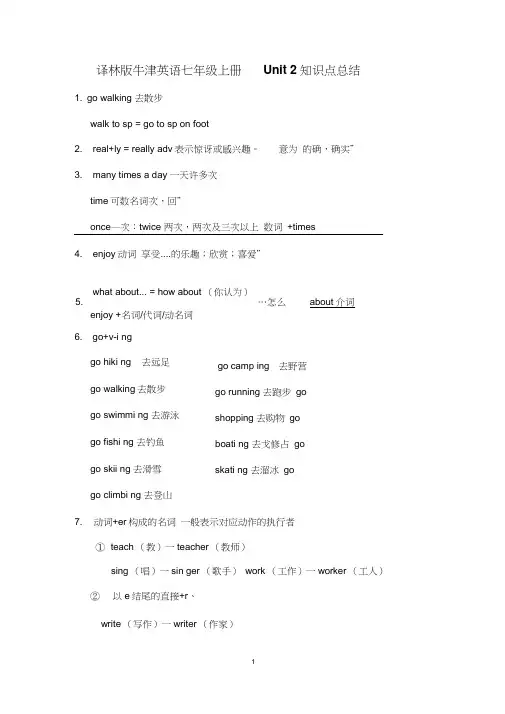
译林版牛津英语七年级上册Unit 2知识点总结1. go walking 去散步walk to sp = go to sp on foot2. real+ly = really adv 表示惊讶或感兴趣。
意为 的确,确实”3. many times a day 一天许多次time 可数名词次,回”once —次:twice 两次,两次及三次以上 数词 +times 4. enjoy 动词 享受....的乐趣;欣赏;喜爱”enjoy +名词/代词/动名词6. go+v-i nggo hiki ng 去远足 go walking 去散步 go swimmi ng 去游泳 go fishi ng 去钓鱼 go skii ng 去滑雪 go climbi ng 去登山7. 动词+er 构成的名词 一般表示对应动作的执行者① teach (教)一teacher (教师)sing (唱)一sin ger (歌手) work (工作)一worker (工人) ②以e 结尾的直接+r 、write (写作)一writer (作家)5.what about... = how about (你认为) …怎么样about 介词go camp ing 去野营 go running 去跑步 go shopping 去购物 go boati ng 去戈修占 go skati ng 去溜冰 godance (跳舞)一dancer (舞蹈家)drive (驾驶)一driver (司机)③以闭音节结尾且末尾只有一个辅音字母的,要双写末尾的辅音字母+erswim (游泳)一swimming (游泳者)run (跑步)一runner (跑步者)win (赢)一winner (获胜者)④部分动词+oract (表演)一actor (男演员)visit (参观)一visitor (参观者)invent (发明)一inven tor (发明家)8. look连系动词看起来连系动词+形容词look strong看起来强壮look happy看起来高兴look young 看起来年轻look pretty 看起来美丽look slim看起来苗条系动词:sound听起来:smell闻起来:feel感觉,觉得:taste 尝起来:seem彳以乎9. free adj①空闲的(反义词busy);②自由的;③免费的①He spends his free time looking after the old woman.②The birds are free in the sky.③Shopping bags are not free now.Be free to do sth自由地做某事10. make sb do sth使某人做某事make sb happy使某人快乐+形容词surprised11. want sth = would like sth 想要某物want sb to do sth = would like sb to do 想要某人做某事would like = ' d没有人称和数的变化12. hope动词希望hope to dohope thathope不可数名词希望,愿望”dream 可数名词梦想,梦bad dream 噩梦13. come true 实现14. week周,星期weekday工作日weekend周末15. certainly = of course 当然certainly 更委婉16. Watch动词看,观看watch TV watch our games观看我们的比赛名词手表,复数watches17. shop vi 购物=go shopping = do some shoppingshop in a mall在商场购物18. many of +名词复数许多..…19. else adj/ad v另外;其他,常放在疑问代词或不定代词后、Adj: who/ what/ whose/ someth ing/anything/nothin g/some one/anyone Adv:whe n/ whereelse / othe:别的;其他的else修饰不定代词和疑问词,置于其后—What else do you wa nt?你还要什么?一Nothi ng else.别的什么都不要。
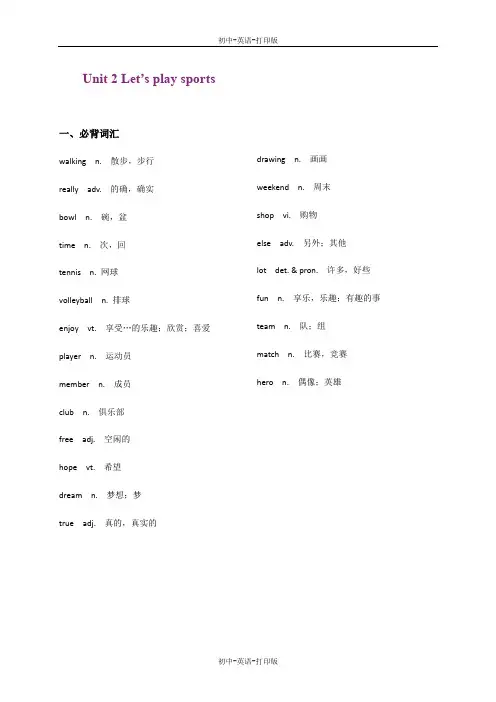
Unit 2 Let’s play sports 一、必背词汇walking n. 散步,步行really adv. 的确,确实bowl n. 碗,盆time n. 次,回tennis n. 网球volleyball n. 排球enjoy vt. 享受…的乐趣;欣赏;喜爱player n. 运动员member n. 成员club n. 俱乐部free adj. 空闲的hope vt. 希望dream n. 梦想;梦true adj. 真的,真实的drawing n. 画画weekend n. 周末shop vi. 购物else adv. 另外;其他lot det. & pron. 许多,好些fun n. 享乐,乐趣;有趣的事team n. 队;组match n. 比赛,竞赛hero n. 偶像;英雄二、重点词汇1. enjoy verb /ɪnˈdʒɔɪ/to get pleasure from something享受…的乐趣;喜爱;欣赏例句:I really enjoyed that movie.我真的很喜欢那部电影。
I want to travel because I enjoy meeting people and seeing new places.我想去旅游,因为我愿意结识不同的人,见识没去过的地方。
2. free adjective /friː/1). not limited or controlled自由的(地);无拘束的(地)例句:Am I free to leave now?现在我可以离开了吗?I'll give you a key, so you'll be free to come and go as you like.我会给你一把钥匙,这样你就可以自由进出了。
2). costing nothing, or not needing to be paid for免费的(地)例句:I got some free cinema tickets.我搞到了一些免费电影票。
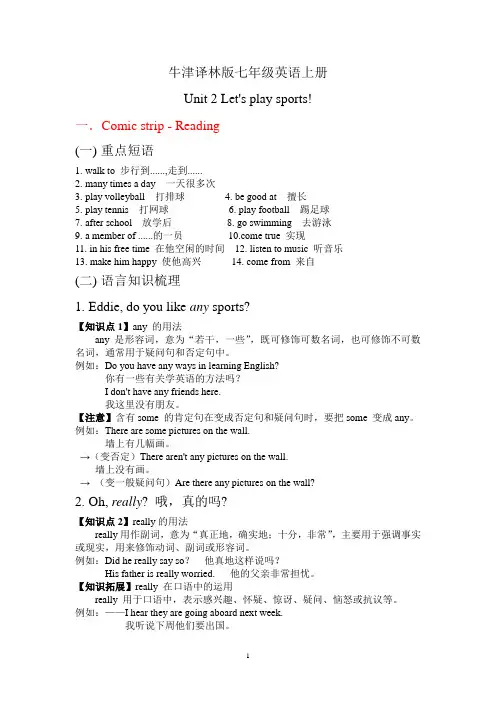
牛津译林版七年级英语上册Unit 2 Let's play sports!一.Comic strip - Reading(一)重点短语1.walk to 步行到......,走到......2.many times a day 一天很多次3.play volleyball 打排球4. be good at 擅长5.play tennis 打网球6. play football 踢足球7.after school 放学后8. go swimming 去游泳9.a member of ......的一员e true 实现11. in his free time 在他空闲的时间12. listen to music 听音乐13. make him happy 使他高兴14. come from 来自(二)语言知识梳理1.Eddie, do you like any sports?【知识点1】any 的用法any 是形容词,意为“若干,一些”,既可修饰可数名词,也可修饰不可数名词,通常用于疑问句和否定句中。
例如:Do you have any ways in learning English?你有一些有关学英语的方法吗?I don't have any friends here.我这里没有朋友。
【注意】含有some 的肯定句在变成否定句和疑问句时,要把some 变成any。
例如:There are some pictures on the wall.墙上有几幅画。
→(变否定)There aren't any pictures on the wall.墙上没有画。
→(变一般疑问句)Are there any pictures on the wall?2.Oh, really? 哦,真的吗?【知识点2】really的用法really用作副词,意为“真正地,确实地;十分,非常”,主要用于强调事实或现实,用来修饰动词、副词或形容词。
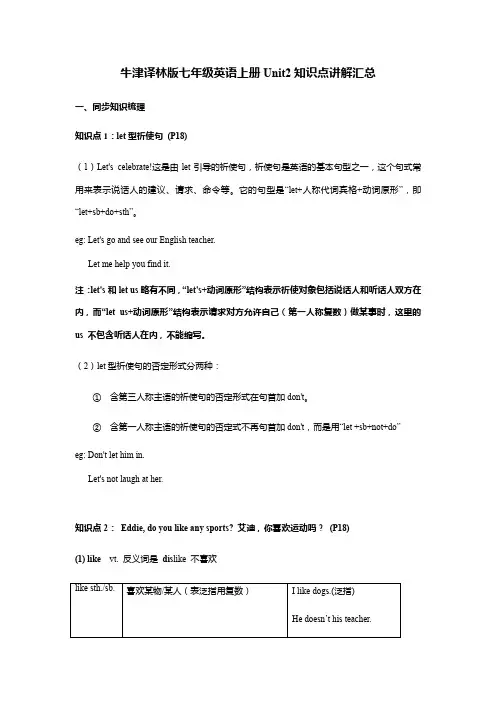
牛津译林版七年级英语上册Unit2知识点讲解汇总一、同步知识梳理知识点1:let型祈使句(P18)(1)Let's celebrate!这是由let引导的祈使句,祈使句是英语的基本句型之一,这个句式常用来表示说话人的建议、请求、命令等。
它的句型是“let+人称代词宾格+动词原形”,即“let+sb+do+sth”。
eg: Let's go and see our English teacher.Let me help you find it.注:let's和let us略有不同,“let's+动词原形”结构表示祈使对象包括说话人和听话人双方在内,而“let us+动词原形”结构表示请求对方允许自己(第一人称复数)做某事时,这里的us 不包含听话人在内,不能缩写。
(2)let型祈使句的否定形式分两种:①含第三人称主语的祈使句的否定形式在句首加don't。
②含第一人称主语的祈使句的否定式不再句首加don't,而是用“let +sb+not+do”eg: Don't let him in.Let's not laugh at her.知识点2:Eddie, do you like any sports? 艾迪,你喜欢运动吗?(P18)(1) like vt. 反义词是dis like 不喜欢(2) sport此处为可数名词,意为“体育运动”eg:Tennis is a popular sport. 网球是一项很流行的运动。
知识点3:Yes, I like walking. 是的,我喜欢散步。
(P18)walking 名词,“散步,行走”(动词+ing 变成名词,也叫动名词),动词形式为walk, 意为“走,步行”eg:Walking in the morning is good for people.知识点4:really adv. (副词) 实际上,事实上;My father didn't really love her. 我爸爸实际上并不爱她。
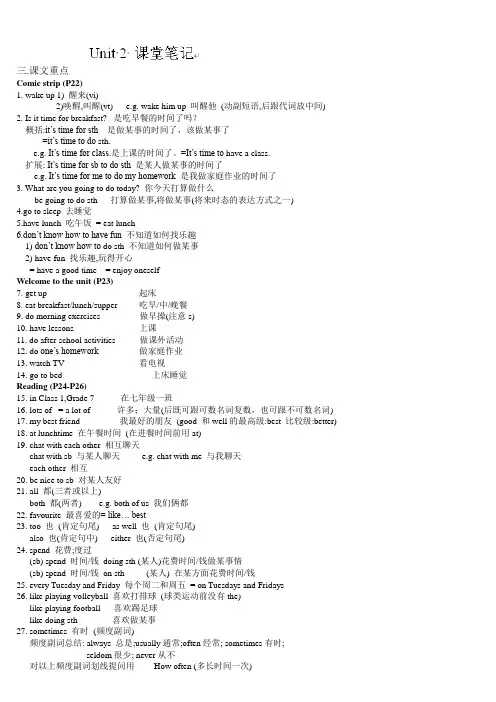
三.课文重点Comic strip (P22)1. wake up 1) 醒来(vi)2)唤醒,叫醒(vt) e.g. wake him up 叫醒他(动副短语,后跟代词放中间) 2. Is it time for breakfast? 是吃早餐的时间了吗?概括:it’s time for sth是做某事的时间了,该做某事了=it’s time to do sth.e.g. It’s time for class.是上课的时间了。
=It’s time to have a class.扩展: It’s time for sb to do sth 是某人做某事的时间了e.g. It’s time for me to do my homework 是我做家庭作业的时间了3. What are you going to do today? 你今天打算做什么be going to do sth 打算做某事,将做某事(将来时态的表达方式之一)4.go to sleep 去睡觉5.have lunch 吃午饭= eat lunch6.don’t know how to have fun 不知道如何找乐趣1) don’t know how to do sth 不知道如何做某事2) have fun 找乐趣,玩得开心= have a good time = enjoy oneselfWelcome to the unit (P23)7. get up 起床8. eat breakfast/lunch/supper 吃早/中/晚餐9. do morning exercises 做早操(注意s)10. have lessons 上课11. do after-school activities 做课外活动12. do one’s homework做家庭作业13. watch TV 看电视14. go to bed 上床睡觉Reading (P24-P26)15. in Class 1,Grade 7 在七年级一班16. lots of = a lot of 许多;大量(后既可跟可数名词复数,也可跟不可数名词)17. my best friend 我最好的朋友(good 和well的最高级:best 比较级:better)18. at lunchtime 在午餐时间(在进餐时间前用at)19. chat with each other 相互聊天chat with sb 与某人聊天 e.g. chat with me 与我聊天each other 相互20. be nice to sb 对某人友好21. all 都(三者或以上)both 都(两者) e.g. both of us 我们俩都22. favourite 最喜爱的= like… best23. too 也(肯定句尾) as well 也(肯定句尾)also 也(肯定句中) either 也(否定句尾)24. spend 花费;度过(sb) spend 时间/钱doing sth (某人)花费时间/钱做某事情(sb) spend 时间/钱on sth (某人) 在某方面花费时间/钱25. every Tuesday and Friday 每个周二和周五= on Tuesdays and Fridays26. like playing volleyball 喜欢打排球(球类运动前没有the)like playing football 喜欢踢足球like doing sth 喜欢做某事27. sometimes 有时(频度副词)频度副词总结: always 总是;usually通常;often经常; sometimes有时;seldom很少; never从不对以上频度副词划线提问用------ How often (多长时间一次)。
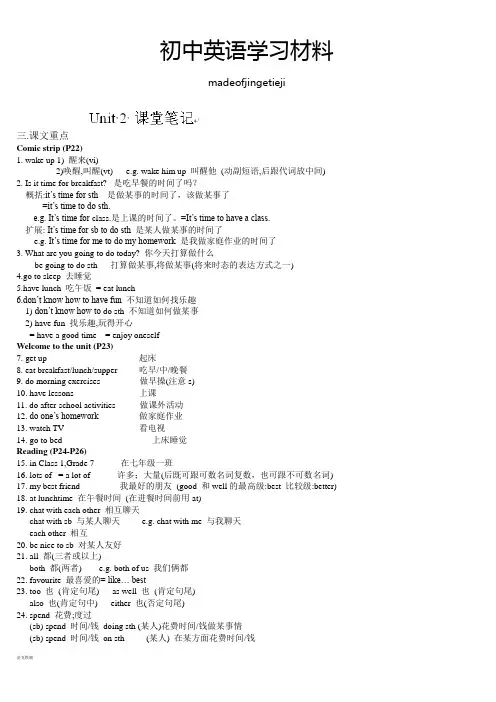
初中英语学习材料madeofjingetieji三.课文重点Comic strip (P22)1. wake up 1) 醒来(vi)2)唤醒,叫醒(vt) e.g. wake him up 叫醒他(动副短语,后跟代词放中间) 2. Is it time for breakfast? 是吃早餐的时间了吗?概括:it’s time for sth是做某事的时间了,该做某事了=it’s time to do sth.e.g. It’s time for class.是上课的时间了。
=It’s time to have a class.扩展: It’s time for sb to do sth 是某人做某事的时间了e.g. It’s time for me to do my homework 是我做家庭作业的时间了3. What are you going to do today? 你今天打算做什么be going to do sth 打算做某事,将做某事(将来时态的表达方式之一)4.go to sleep 去睡觉5.have lunch 吃午饭= eat lunch6.don’t know how to have fun 不知道如何找乐趣1) don’t know how to do sth 不知道如何做某事2) have fun 找乐趣,玩得开心= have a good time = enjoy oneselfWelcome to the unit (P23)7. get up 起床8. eat breakfast/lunch/supper 吃早/中/晚餐9. do morning exercises 做早操(注意s)10. have lessons 上课11. do after-school activities 做课外活动12. do one’s homework做家庭作业13. watch TV 看电视14. go to bed 上床睡觉Reading (P24-P26)15. in Class 1,Grade 7 在七年级一班16. lots of = a lot of 许多;大量(后既可跟可数名词复数,也可跟不可数名词)17. my best friend 我最好的朋友(good 和well的最高级:best 比较级:better)18. at lunchtime 在午餐时间(在进餐时间前用at)19. chat with each other 相互聊天chat with sb 与某人聊天 e.g. chat with me 与我聊天each other 相互20. be nice to sb 对某人友好21. all 都(三者或以上)both 都(两者) e.g. both of us 我们俩都22. favourite 最喜爱的= like… best23. too 也(肯定句尾) as well 也(肯定句尾)also 也(肯定句中) either 也(否定句尾)24. spend 花费;度过(sb) spend 时间/钱doing sth (某人)花费时间/钱做某事情(sb) spend 时间/钱on sth (某人) 在某方面花费时间/钱25. every Tuesday and Friday 每个周二和周五= on Tuesdays and Fridays26. like playing volleyball 喜欢打排球(球类运动前没有the)like playing football 喜欢踢足球like doing sth 喜欢做某事27. sometimes 有时(频度副词)频度副词总结: always 总是;usually通常;often经常; sometimes有时;seldom很少; never从不对以上频度副词划线提问用------ How often (多长时间一次)How often还可用于twice a week 一周两次once a year 一年一次three times a week 一周三次等类型短语提问.28. sometimes, some times, sometime和some time的区别:1) sometimes有时2) some times几次,几倍, 其中的times为可数名词的复数形式3) sometime某时, 指某个不明确的时间,例如:4) some time一段时间,其中的time为不可数名词,意思为“时间”29. practise 练习, 操练practise sth 练习某事practise doing sth 练习做某事 e.g. practise playing the piano 练习弹钢琴30. be a member of … 是…的一名成员31. be a good swimmer 是个好的游泳者= be good at swimming32. send a mail to sb 发一封邮件给某人send mails to sb 发邮件给某人33. about two hours a day 一天大约两小时34. twice a week 一周两次once a week 一周一次three times a week 一周三次Vocabulary (P27)35. make model planes 制作模型飞机36. write letters 写信write a letter to sb 写一封信给某人write to sb 写信给某人37. should 应该(情态动词后动原) shouldn’t 不应该38. on TV 在电视上39. watch too much TV 看太多电视too much 太多(后加不数名词)too many 太多(后加可数名词复数)much too 太(后加形容词或副词)many too (无此用法)Grammar (P28-P30)40. news 新闻(不可数,单数)41. Peter and I both love football.both 都(两者都),用在情动,be动,助动之后,行为动词之前all 都(三者或三者以上都)42.play together 一起玩43.all the time 一直,总是44.know about 了解关于…know much about sth 很了解某事,很懂某事= know a lot about sth44.really happy 真地高兴really great 真地很棒45.from…to… 从…到…46.meet up with 遇见47.go to dancing lessons 去上舞蹈课48.be busy 忙碌的be free 空闲的49. She does not have much time to talk with her friends概括:have time to do sth 有时间做某事do not have any time to do sth 没有任何时间做某事= have no time to do sth50.talk with sb 与某人交谈= talk to sbtalk about sth 谈论关于某事51. all my friends 所有我的朋友52.know them 认识他们know them well 熟悉他们,对他们很了解53. teach us English 教我们英语(用宾格) teach me English 教我英语54. say hello to sb 向某人问好say goodbye to sb 向某人说再见55. hear you well 清楚地听到你Integrated skills (P32-P33)57. some information 一些信息(information不可数)58. each student 每位学生(单数)59.Thank you for organizing the class trip.感谢你组织这次班级旅行概况: thank you for doing sth 感谢你做某事(for 因为,介词,后跟动词加ing) thank you for sth 因某事感谢你拓展: Thanks for sth./doing sth. 因某事或做某事而感谢e.g. Thanks for your help感谢你的帮助= thank you for helping me60. the price for each student 每位学生的花费the price of the book 这本书的价格61. be open 开着(状态) be closed 关着(状态)62.The price is high (价高)The thing is expensive (东西贵)63. look forward to…期盼;盼望look forward to sth 期盼某事look forward to doing sth 期盼做某事(此结构中的to 为介词,后跟动词加ing)e.g. look forward to seeing you 盼望着见到你64.What do you think of your new school? 你认为你的新学校怎么样?What do you think of….? 你认为…怎么样?= H ow do you like …?65.need to practise it more 需要更多地练习它need to do sth 需要做某事don’t need to do sth 不需要做某事,不必做某事need sth 需要某物Pronunciation(P33)66.borrow 借(进); 向…借 e.g. borrow sth from sb 向某人借某物lend 借(出),借给 e.g. lend sth to sb 把某物借给某人Main task(P35)67.be good for ..对…有好处,对…有益be good to sb 对某人友好be good at sth / doing sth 擅长某事/做某事68.get ready for…为…做好准备69.be hard for sb 对某人很困难70.learn more about sth 更多地了解某事Checkout(P37)71.tell me the answer to number two 告诉我第二题答案1) tell sb sth 告诉某人某事2) the answer to ……的答案。
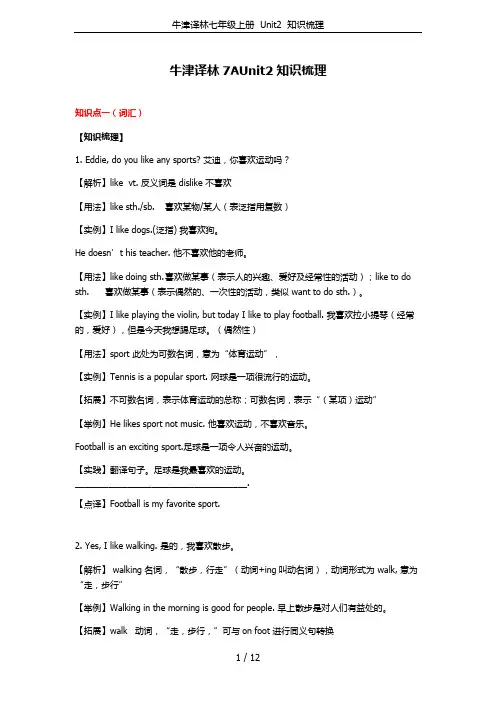
牛津译林7AUnit2知识梳理知识点一(词汇)【知识梳理】1. Eddie, do you like any sports? 艾迪,你喜欢运动吗?【解析】like vt. 反义词是 dislike 不喜欢【用法】like sth./sb. 喜欢某物/某人(表泛指用复数)【实例】I like dogs.(泛指) 我喜欢狗。
He doesn’t his teacher. 他不喜欢他的老师。
【用法】like doing sth. 喜欢做某事(表示人的兴趣、爱好及经常性的活动);like to do sth. 喜欢做某事(表示偶然的、一次性的活动,类似 want to do sth.)。
【实例】I like playing the violin, but today I like to play football. 我喜欢拉小提琴(经常的,爱好),但是今天我想踢足球。
(偶然性)【用法】sport 此处为可数名词,意为“体育运动”,【实例】Tennis is a popular sport. 网球是一项很流行的运动。
【拓展】不可数名词,表示体育运动的总称;可数名词,表示“(某项)运动”【举例】He likes sport not music. 他喜欢运动,不喜欢音乐。
Football is an exciting sport.足球是一项令人兴奋的运动。
【实践】翻译句子。
足球是我最喜欢的运动。
____________________________________.【点译】Football is my favorite sport.2. Yes, I like walking. 是的,我喜欢散步。
【解析】 walking 名词,“散步,行走”(动词+ing叫动名词),动词形式为 walk, 意为“走,步行”【举例】Walking in the morning is good for people. 早上散步是对人们有益处的。
牛津译林版七年级英语上册Unit2归纳知识点汇总1.play sports = do sports 做运动a sports shop 体育用品店play 动词,玩,打→player 运动员2.like doing sth. 长期的爱好like to do sth. 特定环境下的爱好注意:like切勿与would like 的用法混淆would like 意为想要,相当于wantwant to do sthwould like to do sth 想要做某事feel like doing sth3.walk 可以作为动词,也可作为名词go walking= have/take a walk =go for a walk take sb out for a walk 带某人去散步步行到……地方walk to +地点walk to school = go to school on foot步行5分钟的路程 a five minutes’ walk five minutes on foot4.really 真地在句子中所放的位置为行前be后形容词real(真实的,真的)5.time 在本课中,time为可数名词,意为“次数”次数的表达方法为:一次:once 两次:twice三次及三次以上:基数词+times 例如:四次four times 十次ten times对次数提问时,应用how many times例如:I go to the cinema five times a year.提问应为:How many times do you go to the cinema a year?注意:how many times 和how often 之间的区别how many times 是对次数提问,how often对频率提问I go to the cinema five times a year.是对频率进行提问,应为:How often do you go to the cinema?次数+一段时间相当于频率6.play volleyball 球类运动不加thePlay the piano 乐器之前加the7.enjoyenjoy sth.enjoy doing sth 喜欢做某事例如: I enjoy reading.enjoy oneself =have a good time= have fun (in)doing sth = It's fun to do sth 例如:He enjoys himself playing basketball.=He has a good time playing basketball.=He has fun playing basketball.8.favourite = like sth best 最喜欢What’s your favourite sport?(前面用物主代词或名词所有格)= Which/What sport do you like best?9.What about= how aboutwhat about/ how about doing sth./ sth.(1)询问情况I am a student. what about/ How about you? 我是一个学生,你呢?(2)用来表达征求意见和提出建议what about/ How about going fishing tomorrow?Why not do sth?/ Shall we do sth ?/ Let’s do sth ?10.be a member of= be in...club/team= play for club/teamHe is a member of our school football team.=He is in our school football team.look/ feel/ sound/taste/smell为感官动词,后面需要加形容词The sofa feels soft.11.对某人的外貌提问的方法:How does he look?What does he look like?12.f ree自由的:be free to do sth 反义词:busy be busy with / doing sth免费的: Shopping bags are not free now.13.E nglish Club /sports club / dancing club take part in a club =join in a club14.make sb (宾) 使某人……(1)make +宾语+宾补make me strong(2)make sb do sth 使某人做……事Swimming makes her look strong.(3)make sb. Sth.=make sth. for sb.15.hopehope的用法非常重要,常考易错hope to do sthI hope to go on a picnic with you.hope+句子注意:没有hope sb. to do sth. 这种用法,切记切记!!I hope I can help you with your English.如果在考试的时候看到hope后面紧跟的是sb,那么一定是hope后加的句子16.r eal 和true 的区别:real 指事物本身的真假,ture 指故事、消息、信息本身的真实性,不是虚构的17.c ome true 变成现实come from 来自come back回来18.a t weekends = on weekends =at the weekend =on the weekend\19.M any of my students...many of + the/one’s +名词They all = All of them20.e lse常用于特殊疑问词或不定代词后What else = what other thing something else21.R eading is fun. 动名词作主语,谓语动词用单数22.t alk about sth with sb 和某人谈论关于某物23.h ero, potato,tomato、mango 变复数+es24.T here be的一般将来时There will be / There is going to be / There are going to be25.名词所有格:Tom's and Jack’s bedroom 分别拥有Tom and Jack’s bedroom 共同拥有26.s hop = do some shoppingfish = do some fishingread = do some reading。
牛津译林版七上Unit 2 知识点梳理1.Eddie, do you like sports? 埃迪,你喜欢运动吗?like:vt.“喜欢”。
反义:dislike。
like sb./sth. “喜欢某人/某物”;like doing sth.“喜欢做某事”(经常性的动作);like to do sth. “喜欢做某事”(偶然性、一次性的活动)。
like还可作prep.“像”。
be like “像……”;look like “看起来像”。
feel like “想要”。
feel like doing sth. “想要做某事”。
sport:n.“体育运动”。
sports 作定语。
sports news “体育新闻”。
2.I like walking. 我喜欢散步。
walking:n.“散步,步行”。
walk:vi.“走,步行”;n.“走,步行”。
take/have a walk “散步”;go for a walk “去散步”;take sb. for a walk “带某人去散步”。
3.Oh, really? 哦,真的吗?really:adv.“实在,真正地,事实上”。
(表示兴趣或惊讶)real:adj.“真的;真实的”。
4.I walk to my bowl many times a day. 我每天往我的饭碗那儿走好多次。
walk to + 地点:“向某地走去,步行去某地”。
(跟地点副词here、there、home时,省略to)time:可数名词,“次,回”;不可数名词,“时间”。
5.The Class 1, Grade 7 students are writing about their favourite sports. 七年级一班的学生正在写关于他们最喜欢的运动。
the Class 1, Grade 7 students:“七年级一班的学生”。
write about:“写关于……”。
6.I’m good at playing tennis. 我擅长打网球。
英语初一上译林牛津版unit2知识点讲解和练习【单元学习重点和要求】【一】语音1、单词重读`cartoon `favourite `principal `badminton`practise `swimming `playground `modeltech`nology mu`seum ac`tivities infor`mation2、不完全爆破a(c)tivities frien(d)ship theGrea(t)Wall bi(g)trees the firs(t)prize3、句子重音和语调CanI`borrowyour↗pen?Doyou`haveyour↗books?MayI`watch↗TV?Isshe`talland↗slim?Areyou↗busy?Doyou`like↗music?【二】词汇1、单词assembly activities playground snack tuck prin cipal practiseswimmer favourite model badminton cartoon info rmationtechnology museum swimming organizing price trip slim2、词组it’stimefor+名词是做某事的时间了,该做某事了getup 起床after-schoolactivities 课外活动haveassembly 开晨会havelessons 上课eatbreakfast/lunch/supper 吃早/中/晚餐doone’shomework 做家庭作业watchTV 看电视gotobed 上床睡觉keepadiary 记日记adayatschool 在学校的一天lotsof 许多;大量havefun 娱乐,乐趣;快乐morethan 多于;超过twiceaweek 一星期两次swimmingclub 游泳俱乐部readcomicbooks 看连环漫画书have(no)timetodosth. 有〔没有〕时间做某事chatwithsb 和某人聊天/闲谈goswimming 去游泳Iwouldliketo+动词原形情愿干某事;想要干某事from...to…从……到……lookforwardto…期盼;盼望turnon 打开〔电灯、电视、收音机等〕Hereitis! 给你!【三】日常用语Isittimeforbreakfast? 是吃早饭的时候了吗?Whatareyougoingtodotoday? 今天你打算干什么?Pleasee-mailmesoon! 请尽快给我发电子邮件!WeareinClass1,Grade7. 我们在七年级一班。
7上Unit 2 重点短语与复习要点1.walk to =go to on foot 走去2.many times a day 一天多次3.play volleyball /tennis 打排球、网球4.enjoy/like/love doing 喜欢做5.go swimming 去游泳6.What about (doing) sth. 怎么样7.My favourite football star is …我最喜欢的足球球明星是8. a new member of 一名新成员9.play football very much 踢球很好10.look strong 看起来强壮11.in one‘s free time 在某人业余时间12.make sb. strong 使某人强壮13.in the next World Cup在下一届世界杯e true 成为现实15.go with sb. 和某人去16.get up 起床17.watch ball games on TV在电视上看比赛18.at/on weekends=at/on the weekend在周末19.stay at home 呆在家20.make sb. do 是某人做21.feel great 感觉很棒22.read books 读书23.take this bag拿这个包24.play basketball with sb. 和某人打篮球25.watch matches 观看比赛26.play football very well 踢足球好27.talk about 讨论28.school basketball team 校篮球队29.What’s your favourite sport?你最喜欢的运动是什么/30.What else do you like? 你还喜欢什么?31.做运动play sports32.去散步go walking = go for a walk33.走到学校walk to school34.走回家/这儿/那儿walk home / here / there35.遛狗walk a dog36.每天许多次many times a day37.打排球play volleyball网球play tennis38.你最喜欢的运动是什么What’s your favourite sport? 39.你呢?What / How about you?40.……怎么样What about doing sth?41.我喜欢的足球运动员/明星my favourite football player /star 42.看起来很强壮look very strong 连系动词smell/taste/sound/feel/look/become+形容词43.足球踢得很好play football very well44.在他的空余时间里in his free time45.使他很开心make him very happy46.他是黄河足球队的一个新成员He is anew member of Huanghe FootballClub.47.我希望他的梦想成真。
Unit2HobbiesP181.bring joys to our life把快乐带给我们的生活【bring带来①bring sth tosb把某物带给某人(to方向性)②bring sth for sb为某人带来某物(for 服务性)】2.some students’hobbies一些学生的爱好3.after-school clubs课外的俱乐部【区分after-school形容词课外的after school放学后】4.think about思考、考虑【区分①think about思考的对象为事物,更深层次和持续时间更长的思考过程②think of思考的对象既可以为人也可以为物,通常表示一种短暂、即时的、突发性的或瞬间的的思考】5.be important for us对我们来说很重要【①It is important for sb to do sth对某人来说做某事很重要②important形容词重要的importance 名词重要性the importance of···的重要性】☆①It’s+adj+to do sth做某事是···的。
It's exciting to travel to new places.去新地方旅行是令人兴奋的。
②It's+adj+of sb+to do sth:of前的形容词用来形容人物的性格。
某人做某事是···的。
It is so nice of him to help the old people.他很善意去帮助那些老人。
③It's+adj+for sb+to do sth.:for前的形容词用来描述do后面的事物的。
某人做某事是···的。
It is difficult for him to do his homework.对他来说做他自己的作业是很难的。
牛津译林版七年级英语上册Unit2知识点讲解汇总Knowledge Point 1: Let-type Imperative Sentences (P18)1) "Let's celebrate!" XXX "let"。
The imperative sentence is one of the basic sentence patterns in English。
which is often used to express the speaker's ns。
requests。
commands。
etc。
Its sentence structure is "let + personal pronoun (object form) + base form of the verb"。
that is。
"let + sb + do + sth".eg: Let's go and see our English XXX.Let me help you find it.Note: "let's" and "let us" are slightly different。
The structure of "let's + base form of the verb" indicates that the imperative object includes both the speaker and the listener。
while the structure of "let us + base form of the verb" indicates that the speaker requests n to do something (first person plural)。
madeofdingshangtuwen三.课文重点Comic strip (P22)1. wake up 1) 醒来(vi)2)唤醒,叫醒(vt) e.g. wake him up 叫醒他(动副短语,后跟代词放中间)2. Is it time for breakfast? 是吃早餐的时间了吗?概括:it’s time for sth是做某事的时间了,该做某事了=it’s time to do sth.e.g. It’s time for class.是上课的时间了。
=It’s time to have a class.扩展: It’s time for sb to do sth 是某人做某事的时间了e.g. It’s time for me to do my homework 是我做家庭作业的时间了3. What are you going to do today? 你今天打算做什么be going to do sth 打算做某事,将做某事(将来时态的表达方式之一)4.go to sleep 去睡觉5.have lunch 吃午饭= eat lunch6.don’t know how to have fun 不知道如何找乐趣1) don’t know how to do sth 不知道如何做某事2) have fun 找乐趣,玩得开心= have a good time = enjoy oneselfWelcome to the unit (P23)7. get up 起床8. eat breakfast/lunch/supper 吃早/中/晚餐9. do morning exercises 做早操(注意s)10. have lessons 上课11. do after-school activities 做课外活动12. do one’s homework做家庭作业13. watch TV 看电视14. go to bed 上床睡觉Reading (P24-P26)15. in Class 1,Grade 7 在七年级一班16. lots of = a lot of 许多;大量(后既可跟可数名词复数,也可跟不可数名词)17. my best friend 我最好的朋友(good 和well的最高级:best 比较级:better)18. at lunchtime 在午餐时间(在进餐时间前用at)19. chat with each other 相互聊天chat with sb 与某人聊天 e.g. chat with me 与我聊天each other 相互20. be nice to sb 对某人友好21. all 都(三者或以上)both 都(两者) e.g. both of us 我们俩都22. favourite 最喜爱的= like… best23. too 也(肯定句尾) as well 也(肯定句尾)also 也(肯定句中) either 也(否定句尾)24. spend 花费;度过(sb) spend 时间/钱doing sth (某人)花费时间/钱做某事情(sb) spend 时间/钱on sth (某人) 在某方面花费时间/钱25. every Tuesday and Friday 每个周二和周五= on Tuesdays and Fridays26. like playing volleyball 喜欢打排球(球类运动前没有the)like playing football 喜欢踢足球like doing sth 喜欢做某事27. sometimes 有时(频度副词)频度副词总结: always 总是;usually通常;often经常; sometimes有时;seldom很少; never从不对以上频度副词划线提问用------ How often (多长时间一次)How often还可用于twice a week 一周两次once a year 一年一次three times a week 一周三次等类型短语提问.28. sometimes, some times, sometime和some time的区别:1) sometimes有时2) some times几次,几倍, 其中的times为可数名词的复数形式3) sometime某时, 指某个不明确的时间,例如:4) some time一段时间,其中的time为不可数名词,意思为“时间”29. practise 练习, 操练practise sth 练习某事practise doing sth 练习做某事 e.g. practise playing the piano 练习弹钢琴30. be a member of … 是…的一名成员31. be a good swimmer 是个好的游泳者= be good at swimming32. send a mail to sb 发一封邮件给某人send mails to sb 发邮件给某人33. about two hours a day 一天大约两小时34. twice a week 一周两次once a week 一周一次three times a week 一周三次Vocabulary (P27)35. make model planes 制作模型飞机36. write letters 写信write a letter to sb 写一封信给某人write to sb 写信给某人37. should 应该(情态动词后动原) shouldn’t 不应该38. on TV 在电视上39. watch too much TV 看太多电视too much 太多(后加不数名词)too many 太多(后加可数名词复数)much too 太(后加形容词或副词)many too (无此用法)Grammar (P28-P30)40. news 新闻(不可数,单数)41. Peter and I both love football.both 都(两者都),用在情动,be动,助动之后,行为动词之前all 都(三者或三者以上都)42.play together 一起玩43.all the time 一直,总是44.know about 了解关于…know much about sth 很了解某事,很懂某事= know a lot about sth44.really happy 真地高兴really great 真地很棒45.from…to… 从…到…46.meet up with 遇见47.go to dancing lessons 去上舞蹈课48.be busy 忙碌的be free 空闲的49. She does not have much time to talk with her friends概括:have time to do sth 有时间做某事do not have any time to do sth 没有任何时间做某事= have no time to do sth50.talk with sb 与某人交谈= talk to sbtalk about sth 谈论关于某事51. all my friends 所有我的朋友52.know them 认识他们know them well 熟悉他们,对他们很了解53. teach us English 教我们英语(用宾格) teach me English 教我英语54. say hello to sb 向某人问好say goodbye to sb 向某人说再见55. hear you well 清楚地听到你Integrated skills (P32-P33)57. some information 一些信息(information不可数)58. each student 每位学生(单数)59.Thank you for organizing the class trip.感谢你组织这次班级旅行概况: thank you for doing sth 感谢你做某事(for 因为,介词,后跟动词加ing) thank you for sth 因某事感谢你拓展: Thanks for sth./doing sth. 因某事或做某事而感谢e.g. Thanks for your help感谢你的帮助= thank you for helping me60. the price for each student 每位学生的花费the price of the book 这本书的价格61. be open 开着(状态) be closed 关着(状态)62.The price is high (价高)The thing is expensive (东西贵)63. look forward to…期盼;盼望look forward to sth 期盼某事look forward to doing sth 期盼做某事(此结构中的to 为介词,后跟动词加ing)e.g. look forward to seeing you 盼望着见到你64.What do you think of your new school? 你认为你的新学校怎么样?What do you think of….? 你认为…怎么样?= H ow do you like …?65.need to practise it more 需要更多地练习它need to do sth 需要做某事don’t need to do sth 不需要做某事,不必做某事need sth 需要某物Pronunciation(P33)66.borrow 借(进); 向…借 e.g. borrow sth from sb 向某人借某物lend 借(出),借给 e.g. lend sth to sb 把某物借给某人Main task(P35)67.be good for ..对…有好处,对…有益be good to sb 对某人友好be good at sth / doing sth 擅长某事/做某事68.get ready for…为…做好准备69.be hard for sb 对某人很困难70.learn more about sth 更多地了解某事Checkout(P37)71.tell me the answer to number two 告诉我第二题答案1) tell sb sth 告诉某人某事2) the answer to ……的答案。